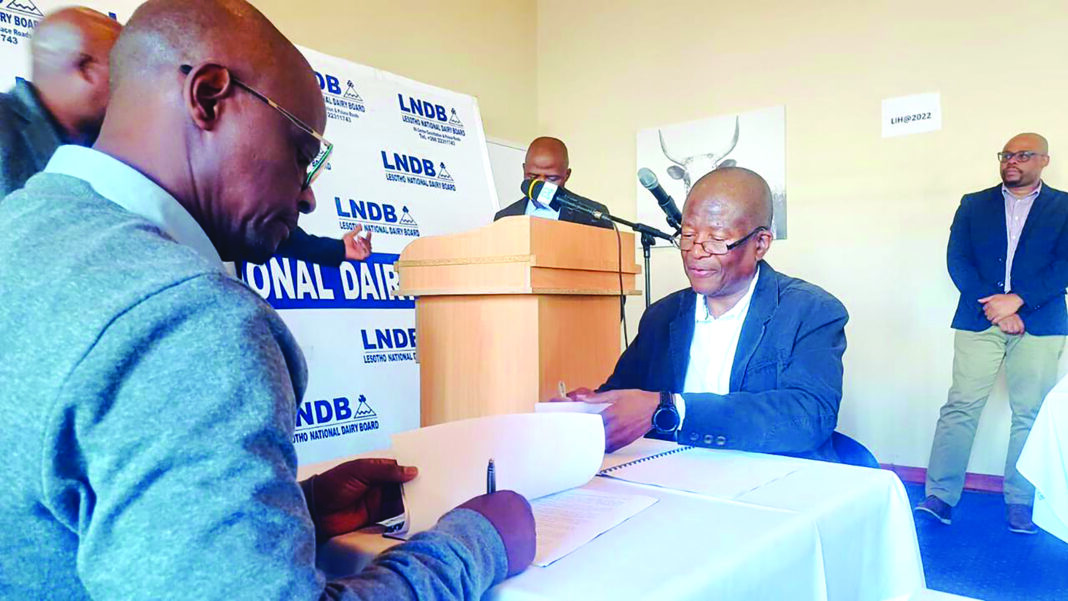Lehlohonolo Motšoari
Lesotho’s dairy industry is poised for a boost following the signing of a Memorandum of Understanding (MoU) between the Lesotho National Dairy Board (LNDB) and Botswana University of Agriculture and Natural Resources (BUANR) on Tuesday.
The ceremony, held in Maseru signifies another step towards regional collaboration for dairy development.
The Botswana University of Agriculture and Natural Resources, remarkably, holds the distinction of being the third-largest dairy producer in Botswana as explained by Puleng Matebesi.
“This expertise caught the eye of the Lesotho National Dairy Board, leading to the establishment of this strategic partnership,” Matebesi explained.
She added, “The two parties have agreed to collaborate in research and development of the dairy industry that includes, but not limited to animal breeding, animal health, animal nutrition and dairy processing.”
Ketlhatlhogile Mosepele, Vice Chancellor of BUANR, shed light on the university’s long-standing commitment to dairy production and relationship with Lesotho while outlining their ambitions for regional expansion.
He also gratified this milestone of “formalising this agreement that has been negotiated a few years ago”.
“Our core mandate is to make Botswana food and nutrition secure at the national level, however, our ambition is to have a regional, continental and global impact; our presence in Lesotho today is testament to this idea,” he said, adding BUANR has a footprint that should be maintained for the benefit of both countries.
“We have hosted and graduated at least nine Basotho undergraduate students, primarily in Agricultural Engineering since 2011. In Botswana, a creation of a knowledge-based economy is part of our National Transformation Agenda. I believe that the same goes for Lesotho because the food production systems of the future will leverage exclusively on technology and innovation,” Mosepele said.
He further indicated that BUANR has a mission to produce innovative graduates and technological solutions for sustainable development in agriculture and natural resources sector.
He also hopes this relationship would continue in other fields of agriculture and natural resources.
“BUANR has capacity to train students in various fields; in Natural Resources Management and in other fields of agriculture,” he continued.
He also mentioned that they are constantly expanding the depth and breadth of their programmes to create a vibrant and dynamic learning environment.
“We are expanding the value chain of our degree programmes and Basotho can definitely benefit from this. We hope that this partnership will serve as a platform for close cooperation between BUANR and other institutions of higher learning and research in Lesotho,” Mosepele said.
Abiel Mashale, CEO of the Lesotho National Dairy Board, underscored the pressing need to address domestic dairy demands which started pre-colonial rule and was commercialised in the early 80’s.
“The dairy industry in Lesotho has not achieved the traction that it is expected of it to contribute towards improving our country’s food security and nutrition, job creation and contribution to the economic growth,” Mashale highlighted.
He said the government established LNDB to stabilise and improve the dairy industry of Lesotho in 1991, regulating the dairy industry and in 1995 the policy was changed and LNDB was mandated to promote and enhance the development of the dairy industry.
“The statistics indicate that in the year 2021, milk production in Lesotho was 12 417 00 litres and 19% of that milk was traded in the formal market,” he revealed.
He noted that LNDB discovered only 80% of the milk sent for handling is processed into sour milk while 19% is used to make fresh milk and insignificant percentage of that milk is used to make yoghurt.
Mashale also indicated that the production and processing of milk in Lesotho does not meet domestic consumption of dairy products, highlighting that over 80% of milk produce is imported from South Africa.
“We are provided with poor quality heifers, our farmers lack training, and we have limited milk processing facilities; these factors contribute to low milk production and contribute to the reliance on imported dairy products,” he said, adding his institution created new departments for capacity building and processing, and collaborated with local institutions and Agriculture Research Council of South Africa.
“Lesotho seeks to leverage Botswana’s expertise in dairy breeding and processing, this collaboration will encompass joint research, technical support, and business development along the dairy value chain,” Mashale said.
On behalf of the Minister of Agriculture, Food Security and Nutrition, the Principal Secretary, Moshe Mosaase echoed Mashale’s sentiments, stressing the significance of a robust dairy industry for food security and nutrition.
“This partnership aims to increase milk production, promote sustainable practices, and potentially lead to exports, and this is a step towards achieving National Development Goals (NSDP2), particularly poverty reduction and food security,” Mosaase said.




